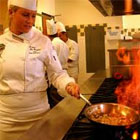
Chef Mil
Berkeley, CA
Female, 49
I have been working in restaurants in the San Francisco Bay Area for over 20 years (two of the restaurants had been in the SF Chronicle's Top 100 Restaurants). I have cooked mostly Mediterranean food, but have some experience with Asian food. I went to cooking school, and worked my way up from being a prep cook (think--prepping 3 cases of artichokes, de-boning 100 quail, and juicing a case of lemons!) to being a chef at a well known restaurant in my area. And no, I am not the yelling type! :)
Hi Jolie, Did you go to UCB? If so, how did you like it here? Anyway, it is a complete surprise when the health inspector comes. My former sous chef knew the guy would show up about every 6 months. This sous chef also knew his car, and would keep an eye out for him! There wasn't much to write up at the restaurant I worked at, but I remember once that he and one of the owners went around and around which way to face the eating side of the spoons and forks in the container!
Hello 2124, Personally, I would make a new dish. I would even get a new plate! Of course, I would examine it and probably try a part they hadn't eaten. You are correct in that it's just a given expense. I've heard that a normal food cost hovers around 30% of expenses in a restaurant. At the restaurant I worked at, we would aim to price our dishes at about 4x the food cost.
Hi Myra, I am pleased with any show that gets folks curious about food and gets them cooking in the kitchen! The angry chef portrayal, I know, makes for good watching, and it's fun to watch if you're not on the receiving end of it. I can't imagine watching a show about a typical day in the kitchen. It would be pretty boring actually. Watching a chef order ingredients, talking with customers and the cooks, receiving deliveries, would make for dull TV, really. One of the chefs I used to work with was a tyrant!!! She (yes, she) would scream obscenities, throw pots and pans, kick over the garbage can...etc. All the cooks were afraid of her, and it the end, it did her in. So for TV I think it is fine, but in real life, in the kitchen, it is not effective method of management.
Hi Micah, This is a question that I have to answer with "it depends". From what I've seen, there aren't really any formal steps. Yes, you have to have certain skills, experience, and you have to make awesome food. But sometimes, I've seen cooks promoted to chef level because they were the senior cook in the kitchen, and the owners needed someone. Other times, like in my case, I became the chef de cuisine because I had been the sous chef, and had run the kitchen several times in the chef's absence. The owners were opening another restaurant, my boss went to oversee that restaurant, and I was left to run the flagship. Personally, it took me a long time before I would call myself chef. As for the creative input, to me, a good idea is a good idea, no matter where it comes from. Once, one of the cooks made a killer staff meal dish that we put on the menu! I remember early in my career my mentor/chef saying he didn't want me to just be a worker bee. He wanted me to come up with ideas. It's nice to have a flow of ideas for dishes especially if you're changing the menu every two weeks!
Veterinarian
 Do you think keeping monkeys as pets is a bad idea?
Do you think keeping monkeys as pets is a bad idea?
Professor
 How do you prevent cheating and plagiarism these days?
How do you prevent cheating and plagiarism these days?
Sushi Chef
 Is there a stigma against sushi restaurants that have non-Asian chefs?
Is there a stigma against sushi restaurants that have non-Asian chefs?
Hi M.M. Hmm...I would have to say no. If the customer ordered it, and didn't like it, well, I would have to say the responsibility of choosing that dish is on the customer. But honestly, I might reconsider if it was a customer that was a regular to the restaurant!
Hi Sue, Yes! Usually, it's hair. (Although I must say, even though it sounds gross, that if I got a dish that had hair in it, I would probably eat it if I knew the person!) Other times, it has been a piece of glass or bugs. I always comp something depending on the severity of the offending matter. At the first restaurant I worked at, someone found a small FROG in their salad. I can't remember if it was still alive or not, but this wasn't during my shift. I still cannot understand how the pantry person did not see or feel a frog.
Hi Ken, I've seen that happen here in the San Francisco bay area. There was a restaurant that got such bad reviews that it got no stars, just a square. It had been a money maker too. I knew one of the waiters that used to work there. She told me she and another waiter from that same restaurant got audited by the IRS because something in their tax returns roused suspicion, that their numbers looked suddenly too low. They went in for an interview, and she pulled out the bad review of the once thriving restaurant. The IRS let them go.
-OR-
 Login with Facebook
Login with Facebook (max 20 characters - letters, numbers, and underscores only. Note that your username is private, and you have the option to choose an alias when asking questions or hosting a Q&A.)
(A valid e-mail address is required. Your e-mail will not be shared with anyone.)
(min 5 characters)
By checking this box, you acknowledge that you have read and agree to Jobstr.com’s Terms and Privacy Policy.
-OR-
 Register with Facebook
Register with Facebook(Don't worry: you'll be able to choose an alias when asking questions or hosting a Q&A.)